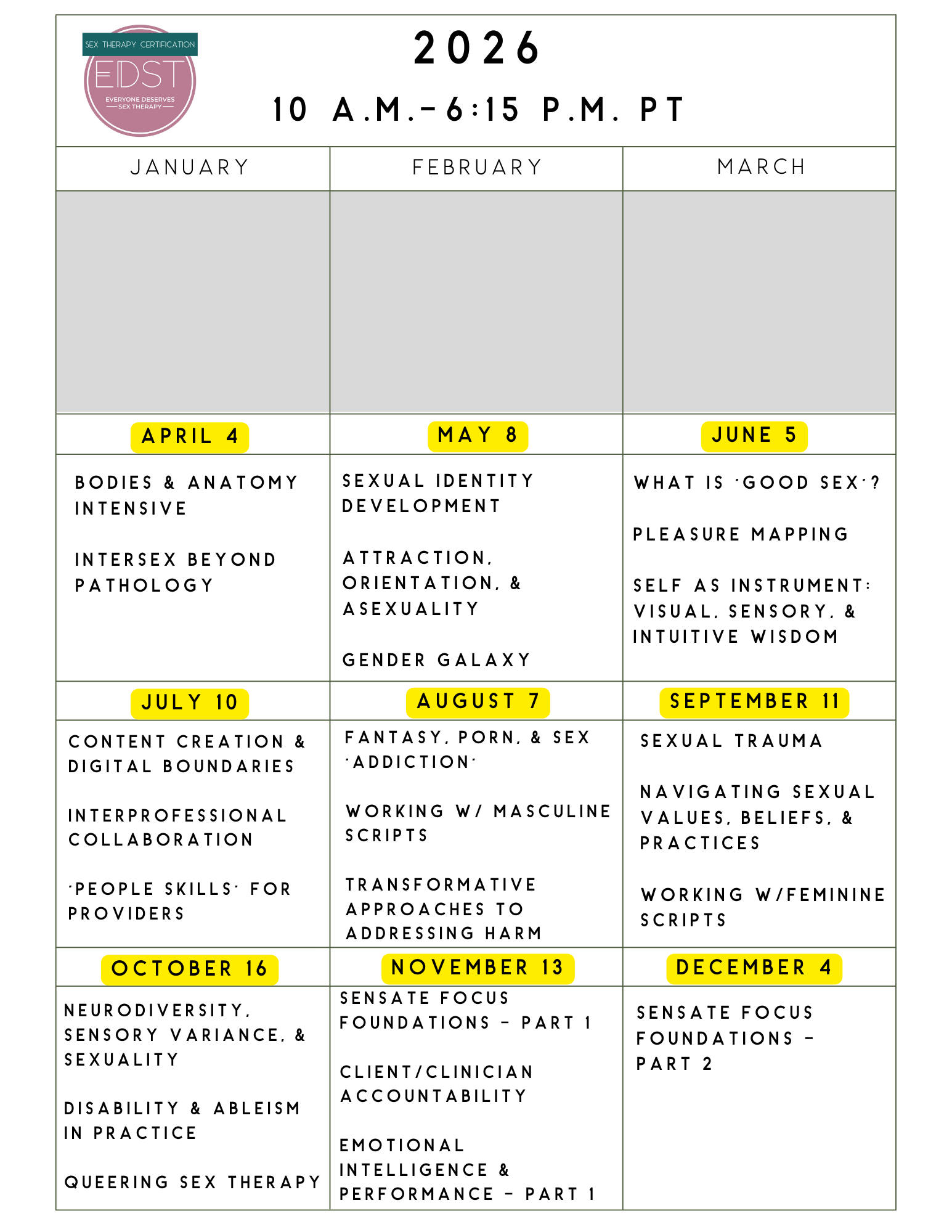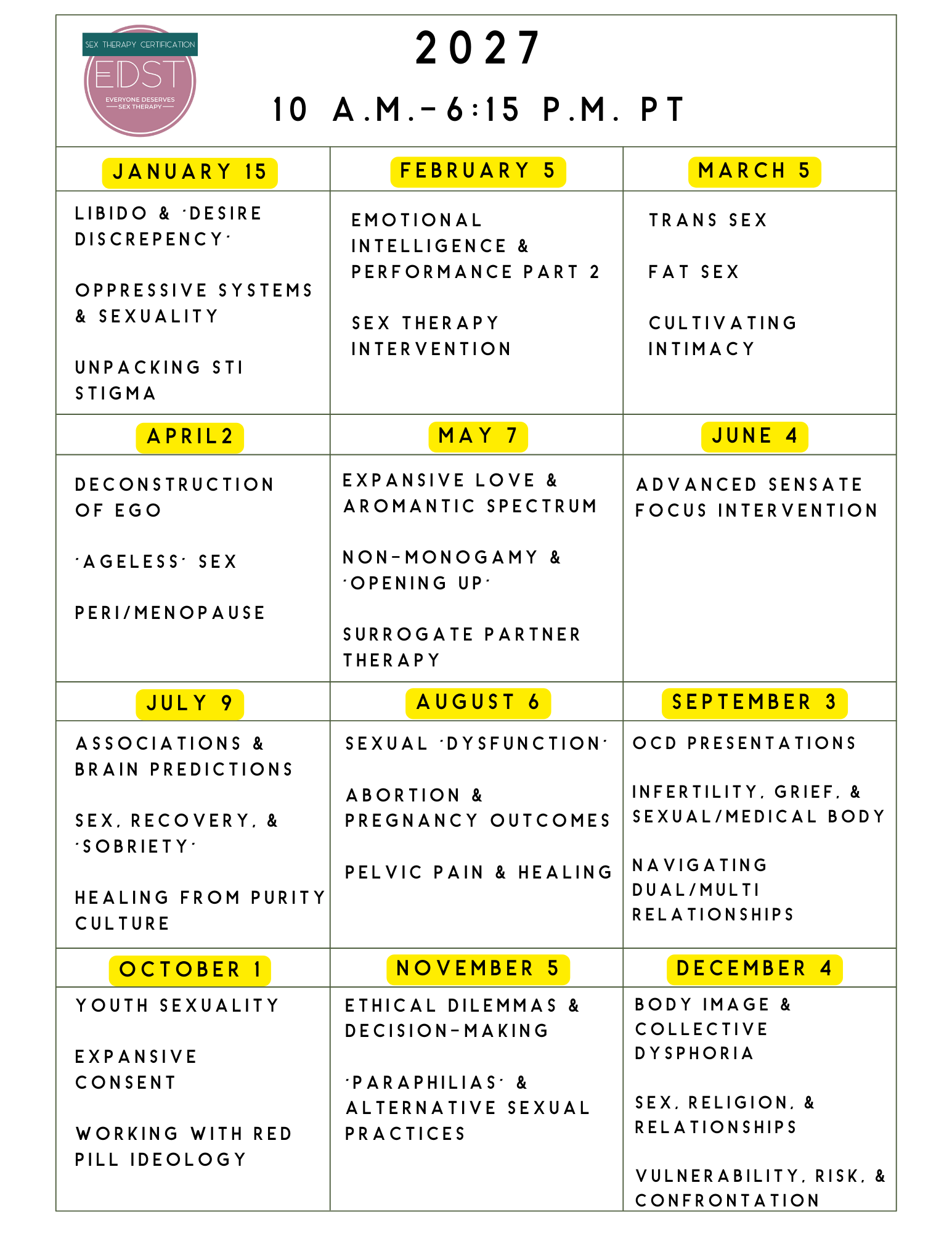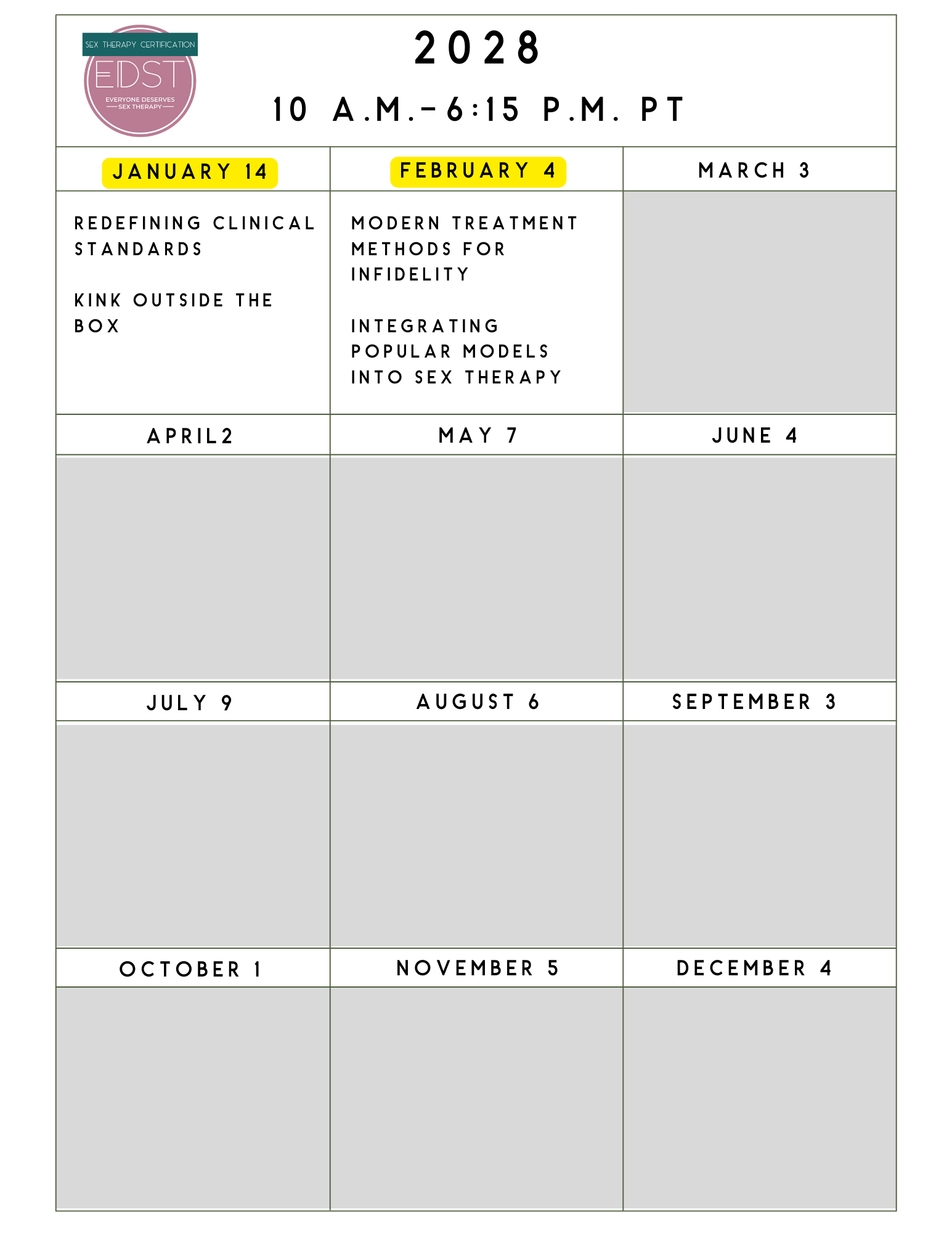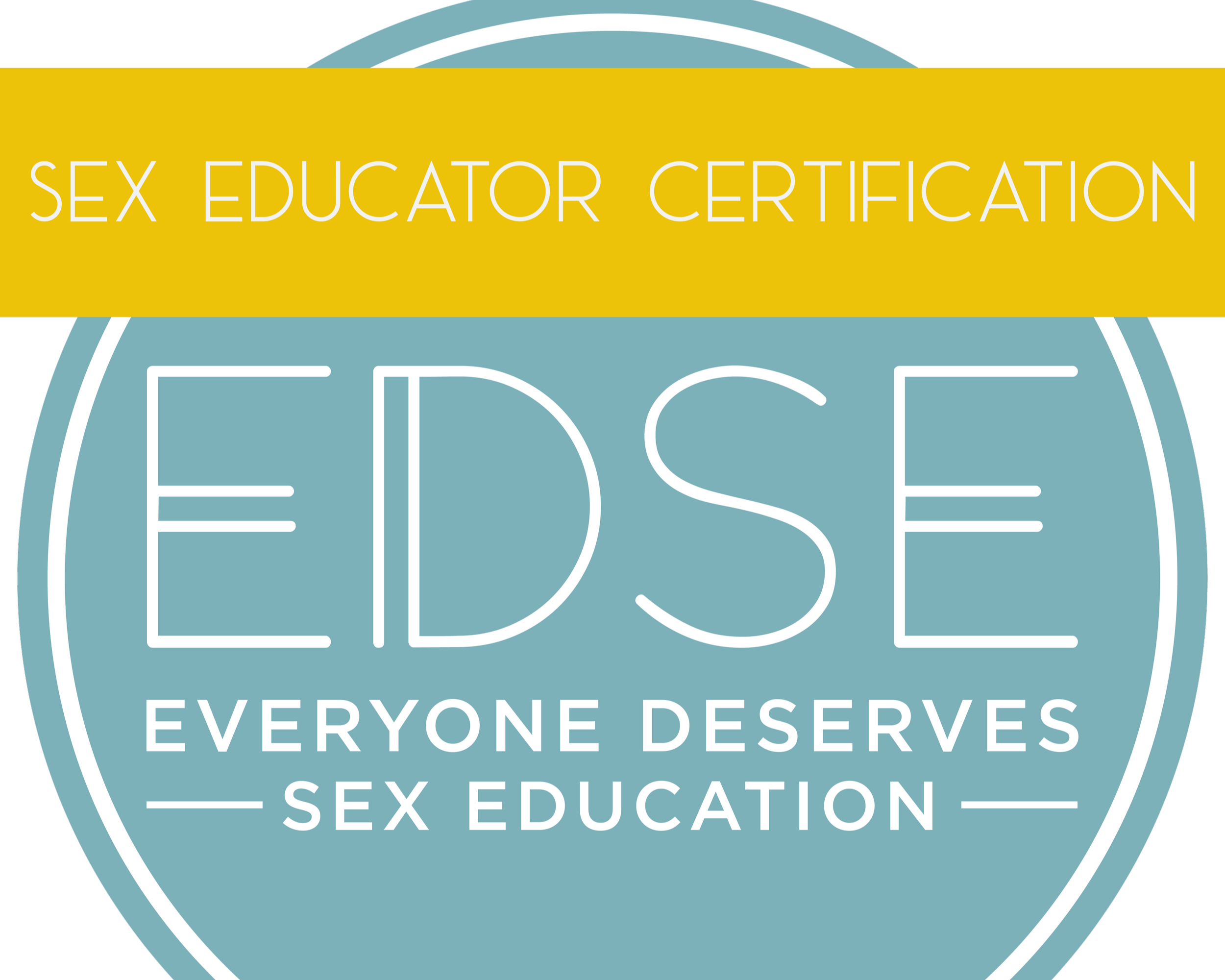SEX THERAPY CERTIFICATION
BECOME A TRULY EXCEPTIONAL SEX THERAPIST
IMPORTANT NOTE: If you are enrolled in EDSE or EDST programming or have submitted an email or application, please add hello@everyonedeservessexed.com to your approved email list and check your spam and junk folders regularly. Our emails are frequently filtered — even if we have already corresponded — and we are not responsible for email correspondence you have missed as a result. This is one of many unfortunate realities for sexuality-related businesses in the U.S.
The expansive, relevant, & forward-thinking sex therapy certification that clinicians deserve.
EDST’s Sex Therapy Certification program is for progressive mental health professionals who want to expand into sex therapy and/or want to incorporate sexuality knowledge and protocols into their practice. EDST attendees want a professional training that they can trust will equip them with the most up-to-date and innovative tools and interventions.
This one-of-a-kind comprehensive professional development training is provided using an intersectional lens that is informed by social, disability, gender, and racial justice frameworks. Our coursework centers empathy, justice, intentional language, and expansiveness while offering tools to help identify the ways power, privilege, and socially constructed belief systems influence the way we and our clients think about sex. This means you will not only receive knowledge, skills, and information, but also essential perspective on human identity, relationships, and development that will last a lifetime. Much of your learning process with EDST will also be an unlearning process. And that’s what makes this work so powerful.
HOW IS EDST DIFFERENT FROM OTHER SEX THERAPY CERTIFICATIONS?
The EDST Sex Therapy Certification is unique because, unlike most others, our focus is on live, experiential, real-time learning over pre-recorded lectures and videos. This means you are supported every step of the way.
EDST attendees want real-world skills to support their clients, but also have the opportunity to practice integrating what they’re learning in authentic ways. Each live training day allows you to interact with our facilitators and your fellow classmates in real-time to develop confidence and comfort with the material while also building community. EDST can help you build confidence around approaching clients with knowledge, compassion, and care while also putting theory into practice. This program will ensure you understand the material AND how to apply it in your sessions.
Research confirms that active learning improves comprehension of new or challenging material, sparks curiosity and understanding, and better prepares students to put their knowledge and skills into practice. It also fuels critical thinking, which EDST believes is an essential part of any learning/unlearning experience.
Each EDST course features active learning methods like large and small group discussion, individual and partner activities, roleplay training, compassionate processing, personal reflection, and more. We use these methods not only for their cognitive and academic benefits, but also because they can promote building socioemotional perspectives that are essential for working in the sexuality field, yet not always present in academic and professional development spaces.
In other words, EDST can help you get even clearer about the kind of sex therapist you want to be, and feel confident as you embark on this new chapter of your exciting career.
HAVE QUESTIONS NOT ANSWERED IN OUR FAQS? TALK TO A HUMAN, NOT A CHAT BOT.
WHO IS EDST FOR?
Traditional psychotherapy, social work, or clinical degree programs do not adequately prepare attendees to address sex, pleasure, trauma, non-normative relational dynamics, gender, and other sensitive and deeply personal issues that inevitably come up in their work.
Degree programs that do offer sexuality-specific training typically center normative perspectives that do not accurately reflect the expansiveness of human sexuality, and they often perpetuate outdated myths, harmful pathology, and false assumptions that modern research and analysis consistently challenge.
EDST attendees feel motivated to disrupt this cycle — they may already be doing so in their personal and professional lives — and choose to collaborate with mentors, supervisors, educators, and professional development programs that can help them along the way.
We especially recommend that you apply to the EDST program if you:
Prefer an active and interactive learning experience over watching pre-recorded webinars.
Enjoy or feel inspired by authentic discussions about stigmatized topics.
Feel driven to use your power to make impactful, incremental change within your field.
Recognize the political nature of sex, identity, and relationships and/or want to build a stronger understanding of how it all intersects.
Want a progressive, up-to-date Sex Therapy Certification that will automatically cover the training requirements for AASECT Sex Therapy Certification.*
WHO IS EDST NOT FOR?
We do not recommend that you apply to the EDST program if:
You are looking for a pre-recorded, fast-tracked way to get a Certified Sex Therapist credential.
You feel uncomfortable and unwilling to discuss topics like white supremacy, racism, classism, disability, patriarchy, misogyny, transphobia, fatphobia, and more.
You “stay out of politics” and/or believe sex is not political.
You are looking for a faith-based training centered in religious values and beliefs.
You do not support sex workers or believe sex work is work.
You consider yourself to be “gender critical” or believe that identity-specific words like “cisgender” are offensive.
You don’t believe that privilege — especially white privilege — exists.
WHAT ARE THE REQUIREMENTS TO APPLY?
EDST applicants must:
Have a Master’s or advanced clinical degree in psychology, social work, family therapy, counseling, psychiatric nursing, or a related field. If the applicant lives outside of the U.S. or Canada, they must hold an equivalent degree. Email us if you aren’t sure if you’ve met these requirements.
OR
Be in the process of completing a Master’s or advanced clinical degree in psychology, social work, family therapy, counseling, psychiatric nursing, or a related field; and can provide proof of enrollment along with an expected date of completion.Demonstrate a commitment to expansiveness as defined as: having respect and openness for, and supporting and promoting the differences in humankind, including race, culture, language, age, gender, ability, disability, sexual orientation, and relationship styles; and sex-positivity as defined as: practicing, holding, and promoting affirming attitudes about the vastness of sex and human sexuality; demonstrating respect for the sexual identity and sexual behavior** (or lack thereof) of others; and being willing and able to examine and take responsibility for biases, judgments, and knowledge gaps as they arise.
*EDST attendees must also complete 18 months of supervision with at least one EDST-approved supervisor. This can be completed while attending EDST programming. If you plan to use your EDST certification to also seek AASECT certification, your supervisor(s) must be an AASECT-certified Supervisor of Sex Therapy.**In the context of sex-positivity, sexual behavior refers to consensual activity done with the intention of expressing, sharing, or experiencing sexual identity, pleasure, desire, or other forms of play or exchange. If it is not consensual, it is not considered sexual behavior — it is instead abuse or harm.
Complete your EDST Sex Therapy Certification from the comfort of your home, dorm, or office!
WHAT IS THE TRAINING LIKE?
EDST’s Sex Therapy Certification program takes place live online and can be attended from anywhere with an internet connection. Programming is hosted online once a month, on a Friday or Saturday, and takes place between the hours of 10 a.m. and 5 p.m. PT.
Each month’s training day features 6 total hours of content, either three 2-hour courses or two 3-hour courses. Each training day includes time for multiple 15-minute breaks.
Courses begin April 4, 2026!
HOW DO I COMPLETE THE PROGRAM?
To complete EDST’s Sex Therapy Certification, you must:
Be present for at least 80% of all live trainings. Please read #20 in our FAQs for more on this.
Watch the recording of each live training you were unable to attend and complete any associated assignments. Please read #21 and #22 in our FAQs for more on this.
Complete 50 total hours of supervision over the course of at least 18 months. This is in accordance with EDST and AASECT requirements. Please read #18 and #19 in our FAQs for more on this.
Complete the EDSE x ANTE UP! Sexual Attitude Reassessment (SAR). Please read #16 in our FAQs for more on this.
Complete a “My Sex Therapist Self” final project that helps you identify your professional goals, values, and approach.
Attend an “exit interview” to prepare you for completing the program, answer any remaining questions you might have, and celebrate your hard work!
THE EDST SEX THERAPY CERTIFICATION PROGRAM AT A GLANCE:
HOW LONG DOES IT TAKE TO GET CERTIFIED?
It takes approximately 2 years to finish the EDST Sex Therapy Certification. This is the amount of time it takes to complete EDST’s program requirements and supervision hours, while also covering all requirements for AASECT Sex Therapy Certification. NOTE: EDST is not simply a path toward AASECT certification — we cover more content and training hours than AASECT requires!
If you are looking for a fast-track program, we understand! Unfortunately, that means EDST is not the right fit.
HOW MUCH IS TUITION?
EDST is proudly offering introductory tuition rates to celebrate our Sex Therapy Certification’s debut! These tuition rates are available only to those who apply in 2026.
You have the option to bundle your tuition with or without our Sexual Attitude Reassessment (SAR), which is required to complete our program. SARs from other programs can not be used as a substitute. For more on this, please refer to FAQ #16.
When you fill out your application and/or payment form, you will be asked to select the tuition rate that best suits your needs.
To confirm a 24-month payment plan, please submit a Payment Plan Authorization form following signup and email it to edst@everyonedeservessexed.com.
STANDARD RATE
With SAR: $12,520
Payment plan: $490.42 USD/month for 24 months (after $750 deposit)***Without SAR: $11,995
Payment plan: $468.54 USD/month for 24 months (after $750 deposit)***This is the cost and value of the certification. Select this if the cost will not prevent you from meeting your housing, food, transportation, childcare, and other basic needs, even though it might mean you have to temporarily cut back on some non-essential spending. If you are an employee of a company that is funding or supporting your tuition, you must pay the Standard Rate.
EQUITY RATE (Only three available)
With SAR: $10,520
Payment plan: $407.08 USD/month for 24 months (after $750 deposit)***Without SAR: $9,995
Payment plan: $385.21 USD/month for 24 months (after $750 deposit)***Select this if paying the Standard Rate would mean your basic monthly needs, like housing, food, transportation, or childcare, would not be met or that your financial stability would be put at risk. If you choose this option but can genuinely afford the Standard Rate, you are taking this option away from someone who genuinely needs it. This rate is NOT available to employees of companies that are funding or supporting their tuition.
ACCESSIBILITY RATE (Only three available)
With SAR: $8,520
Payment plan: $323.75 USD/month for 24 months (after $750 deposit)***Without SAR: $7,995
Payment plan: $301.88 USD/month for 24 months (after $750 deposit)***Select this rate if you are unemployed or underemployed, on disability or government assistance, or struggle to make ends meet, and paying the Equity Rate would prevent you from meeting your housing, food, transportation, childcare, and other basic needs month to month. This is available only to people experiencing financial hardship who, without it, would not have the means to attend. If you choose this option but can genuinely afford the Standard or Equity rates, you are taking this option away from someone who genuinely needs it. This rate is NOT available to employees of companies that are funding or supporting their tuition, regardless of student status.
***A $750 USD deposit is required upon signup. Deposits are non-refundable unless you are not accepted into the program. Visit our FAQs to learn about scholarship guidelines, no-interest payment plans, and more about this program.
Please note: If you select the Equity or Accessibility rate and do not pay in full when you sign up, you must submit your payment plan authorization form or remaining balance authorization form within 5 days of submitting your application. These discounted tuition rates can not be held or reserved without full payment or submitting one of these forms, and your seat will be made available to the next eligible applicant if we do not receive your forms by the due date.
For more about tuition and payments, please refer to FAQs #25-32.
WHAT ABOUT SCHOLARSHIPS?
Each year, EDST offers two $11,245 scholarships available only to queer or transgender Black, Indigenous, Brown, Asian American Pacific Islander, and People of Color. This is a need-based scholarship reserved for folks who, without this financial aid, would not be able to attend this program.
Each scholarship recipient is asked to invest $1,275 in their EDST certification. This amount can be paid in full, or with a 12-month or 24-month payment plan. The scholarship covers the cost of the full program, including the Sexual Attitude Reassessment (SAR).
12-month scholarship payment plan: $106.25/month
24-month scholarship payment plan: $53.13/month
Please read #32 in our FAQs before submitting an application. If you have access to funding and/or can afford our tiered tuition fees, do not apply for this scholarship. Representatives of businesses, non-profits, and professional organizations are disqualified from receiving this scholarship.
FILL OUT THE SCHOLARSHIP FORM HERE.
IS THERE A COMMUNITY FUND TO HELP OTHERS AFFORD EDST?
Yes! We understand that some clinicians are financially abundant and wish to help pay it forward for colleagues with financial limitations, which is so generous and kind. If this is you, please review FAQ #42 and follow the steps. THANK YOU!
HOW IS YOUR TUITION USED?
You might notice that EDST’s tuition is higher than other sex therapy certifications. This is because it is a live, interactive program with courses created specifically for EDST. We do not use pre-paid, pre-recorded content or repurpose videos of older classes, and our facilitators are paid the same fee every time they teach for us. Additionally, we do not use unpaid or underpaid labor from interns or emerging professionals. EDST is self-funded and we do not receive outside financial support or capital investment.
Your tuition enables EDST to fairly compensate our facilitators and support staff for their expertise, time, and labor. It also makes space for financial aid to be made available to those with financial limitations and/or queer or transgender attendees who are also Black, Indigenous, Brown, Asian American Pacific Islander, or a different racialized identity that has historically been subject to systemic discrimination, dehumanization, and disenfranchisement.
For more on this, please refer to FAQ #25.
WHAT TOPICS & SKILLS DOES EDST COVER?
EDST’s Sex Therapy Certification was made to address up-to-date topics, skills, perspectives, and interventions that are often missing from other programs! We built our curriculum using valuable feedback, perspectives, and experiences shared with us by therapists, supervisors, and clinicians working in academia and/or the sexuality field.
During your two years with EDST, you will cover sexuality topics like:
Sexual identity development throughout the lifespan
Understanding and working with libido beyond “desire discrepancy”
Sexuality norms, expectations, and social constructs
Understanding gender as more than a “spectrum”
Bodies and pleasure anatomy through an anti-oppressive lens
“Paraphilias” and alternative sexual practices
Sex, death, and grief
Trauma-informed approaches to addressing pelvic pain
Identifying and combating red-pill ideology
“Sober sex” and pleasure in recovery
Sex, pleasure, and peri/menopause
And sex therapy skills like:
Sensate Focus
OCD presentations and impact on identity, pleasure, and relationship
Surrogate partner therapy and the triadic model
Modern approaches to infidelity, sex or porn “addiction,” and other common relational challenges
Navigating differing sexual values, beliefs, and practices
Neurodiversity, sensory variance, and sexual expression
Vulnerability, risk, and confrontation in sex therapy
Deconstructing the ego of the developing sex therapist
Working with social scripts, gender expectations, and expressions related to masculinity and “manhood”
Interprofessional practice: community through strategic collaboration and referral
Visual, sensory, and intuitive wisdom in sex therapy
WHAT ARE EDST’S ACCESSIBILITY ACCOMMODATIONS?
The following accessibility accommodations are standard in EDST programming:
Attendees are not required to have their cameras or microphones on during the trainings.
Attendees are encouraged to show up as they are. “Professional” attire or appearance is not expected, nor is it endorsed. Please prioritize your physical needs and comfort.
Eating, drinking, stretching/moving, and taking bio breaks are permitted and encouraged throughout the training, not just during designated breaktime.
The text chat is utilized in every training, and attendees are encouraged to participate using the chat if they are unable or do not want to participate verbally. Facilitators read out loud what attendees write in the chat so that it is included in the discussion.
Every training features live closed captioning, which shows up as white text on a black background at the bottom of the screen. Attendees can adjust the font size according to their needs.
Each session features a live transcript, which displays what is being said in real time on the right-hand side of the screen.
Facilitators are provided with written instructions for making their trainings more visually accessible. This includes: using presentations slides and creating them using high-contrast colors, large sans-serif fonts, and graphic and audio descriptions. Slides are also available to attendees to review afterward.
EDST works hard to improve accessibility with each training and we are always exploring capabilities that are unique to an online setting. If you require sign language interpretation, teaching materials additionally modified for vision or hearing impairment, or any other accessibility accommodations not listed here, please email us at edst@everyonedeservessexed.com 75 days prior to Day 1 of the training so we have time to accommodate your needs.
Have questions that aren’t addressed here? Visit our FAQs page or email us here.
LOOKING FOR MORE WAYS TO LEVEL-UP YOUR SEXUALITY CAREER?
Become the sex educator you wish you’d had in school!
Build your business with expert help!
Learn & earn CEs from the comfort of home!
Shop for books, teaching tools, swag, & more!








